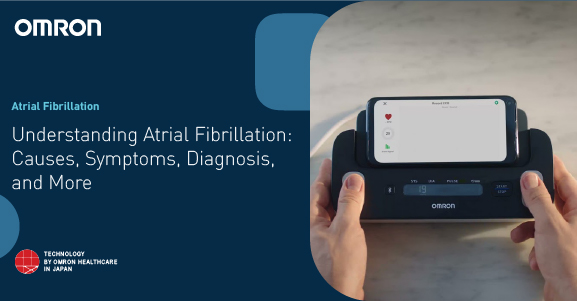Understanding Atrial Fibrillation: Causes, Symptoms, Diagnosis, and More
May 20, 2024 2024-08-11 12:02Understanding Atrial Fibrillation: Causes, Symptoms, Diagnosis, and More

Understanding Atrial Fibrillation: Causes, Symptoms, Diagnosis, and More
Atrial fibrillation (AFib) is the most common type of arrhythmia, characterized by an irregular and often rapid heart rate. This condition can lead to various complications, including stroke, heart failure, and other heart-related issues. Understanding AFib, its origins, symptoms, and diagnosis, including the use of contemporary ECG technologies, is critical for successful management and treatment.
Causes of Atrial Fibrillation
When the two top chambers of the heart, the atria, beat erratically and out of rhythm with the two bottom chambers, the ventricles, it results in atrial fibrillation. Stroke may result from this uneven rhythm’s decreased blood flow and elevated risk of clot development. Atrial fibrillation can occur because of several circumstances. Significant factors include heart-related disorders such as hypertension, coronary artery disease, problems with the heart valves, and congenital heart abnormalities. Obesity, diabetes, and thyroid conditions-particularly hyperthyroidism-can raise the chance.
AFib can be brought on by certain lifestyle choices, such as smoking, binge drinking, and experiencing high amounts of stress. An additional factor that may raise the risk of getting AFib is the family history of the disorder. Furthermore, various health issues such as sleep apnea, lung diseases, and viral infections can play a role.
Symptoms of Atrial Fibrillation
Palpitations, or a fluttering or hammering sensation in the chest, are one of the signs of an arrhythmia that can vary in intensity. It’s typical to feel fatigued, or abnormally weak or exhausted, especially after exerting yourself physically. Other symptoms include chest discomfort, lightheadedness or dizziness, trouble breathing during routine activities or during rest, and shortness of breath. Chest discomfort must be treated with more care since it can be a sign of a heart attack.
Diagnosis of Atrial Fibrillation
For the purpose of treating AFib and avoiding complications, early diagnosis is essential. The primary method of diagnosing AFib is an electrocardiogram (ECG). The most trustworthy way to identify AFib is to use an ECG monitor, which monitors the electrical activity of the heart. An ECG machine can be used for this at home or at a medical facility.
Intermittent AFib events can be identified with the use of continuous monitoring over an extended period, which facilitates the detection of abnormal rhythms that do not occur often. Thanks to recent developments, it is now feasible to do an ECG check at home, which enables continuous and regular monitoring and makes it simpler to identify irregularities in heartbeat outside a clinical setting.
Treatment and Management of Atrial Fibrillation
The main goals of treatment for atrial fibrillation (AFib) are blood clot prevention, normal rhythm restoration, and heart rate management. Commonly used medications include beta-blockers and calcium channel blockers to regulate heart rate, anticoagulants to avoid stroke, and antiarrhythmics to control heart rhythm. It’s also critical to make lifestyle adjustments which include cutting back on drinking, giving up smoking, controlling stress, and keeping a healthy weight.
Living with Atrial Fibrillation
AFib management requires routine monitoring and lifestyle modifications. To check heart health, regular ECG monitoring is necessary, whether done at a clinic or at home using ECG equipment. Adherence to medicine is essential; patients must take their medications as directed and inform their doctors of any adverse effects. It is essential to have a balanced diet, exercise frequently, and stay away from triggers like too much alcohol or coffee. It is also beneficial to engage in stress-reduction practices like yoga, meditation, or deep breathing exercises.
Conclusion
Atrial fibrillation is a common but serious heart condition that requires diligent management. Understanding its causes, recognizing the symptoms, and utilizing modern diagnostic tools like ECG monitors can lead to timely and effective treatment. With advancements in technology, regular ECG checks at home have become more accessible, allowing individuals to monitor their heart health proactively. If you suspect you have irregular heartbeats, consult with a healthcare provider for a comprehensive evaluation and personalized treatment plan. Managing AFib effectively can significantly reduce the risk of complications and improve the quality of life.






